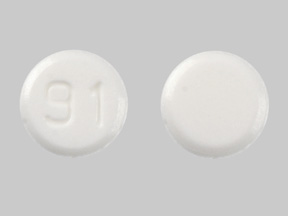Pramipexole Disease Interactions
There are 4 disease interactions with pramipexole.
Dopamine agonists (applies to pramipexole) neuroleptic malignant syndrome
Major Potential Hazard, Low plausibility.
The use of dopamine agonists is contraindicated in patients with neuroleptic malignant syndrome (NMS). NMS is characterized by hyperthermia, muscle rigidity, altered mental status, irregular pulse or blood pressure, tachycardia, and diaphoresis. The syndrome may rarely be precipitated by abrupt discontinuation of the dopamine agonist.
Pramipexole (applies to pramipexole) renal function disorders
Major Potential Hazard, Moderate plausibility. Applicable conditions: Renal Dysfunction
Pramipexole is eliminated by the kidneys, and approximately 90% of the drug is excreted unchanged in the urine. Renal insufficiency decreases the renal clearance and increases the half-life. Therapy with pramipexole should be administered cautiously and at a reduced dose in patients with compromised renal function. Pramipexole clearance is extremely low in dialysis patients, as a negligible amount of the drug is removed by it.
Dopamine agonists (applies to pramipexole) hypotension
Moderate Potential Hazard, Moderate plausibility.
Dopamine agonists may impair the systemic regulation of blood pressure, with resultant orthostatic hypotension at any time, but especially during dose escalation. Additionally, patients with Parkinson's disease may have an impaired capacity to respond to an orthostatic challenge. For these reasons, patients with Parkinson's disease (or restless legs syndrome) who are being treated with dopaminergic agonists typically require careful monitoring for signs/symptoms of orthostatic hypotension, especially during dose escalation, and should be advised of this risk.
Dopaminergic antiparkinsonian agents (applies to pramipexole) psychosis
Moderate Potential Hazard, Moderate plausibility.
Ordinarily, patients with major psychotic disorder should not be treated with dopaminergic antiparkinsonian agents, because of the risk of exacerbating psychosis. Hallucinations and psychotic-like behavior have been reported with dopaminergic medications. In addition, certain medications used to treat psychosis may exacerbate the symptoms of Parkinson's disease and may decrease the effectiveness of these drugs. The use of bromocriptine in patients with severe psychotic disorders is not recommended.
Switch to professional interaction data
Pramipexole drug interactions
There are 258 drug interactions with pramipexole.
Pramipexole alcohol/food interactions
There is 1 alcohol/food interaction with pramipexole.
More about pramipexole
- pramipexole consumer information
- Check interactions
- Compare alternatives
- Pricing & coupons
- Reviews (243)
- Drug images
- Side effects
- Dosage information
- Patient tips
- During pregnancy
- Drug class: dopaminergic antiparkinsonism agents
- Breastfeeding
- En español
Related treatment guides
Drug Interaction Classification
| Highly clinically significant. Avoid combinations; the risk of the interaction outweighs the benefit. | |
| Moderately clinically significant. Usually avoid combinations; use it only under special circumstances. | |
| Minimally clinically significant. Minimize risk; assess risk and consider an alternative drug, take steps to circumvent the interaction risk and/or institute a monitoring plan. | |
| No interaction information available. |
Further information
Always consult your healthcare provider to ensure the information displayed on this page applies to your personal circumstances.


